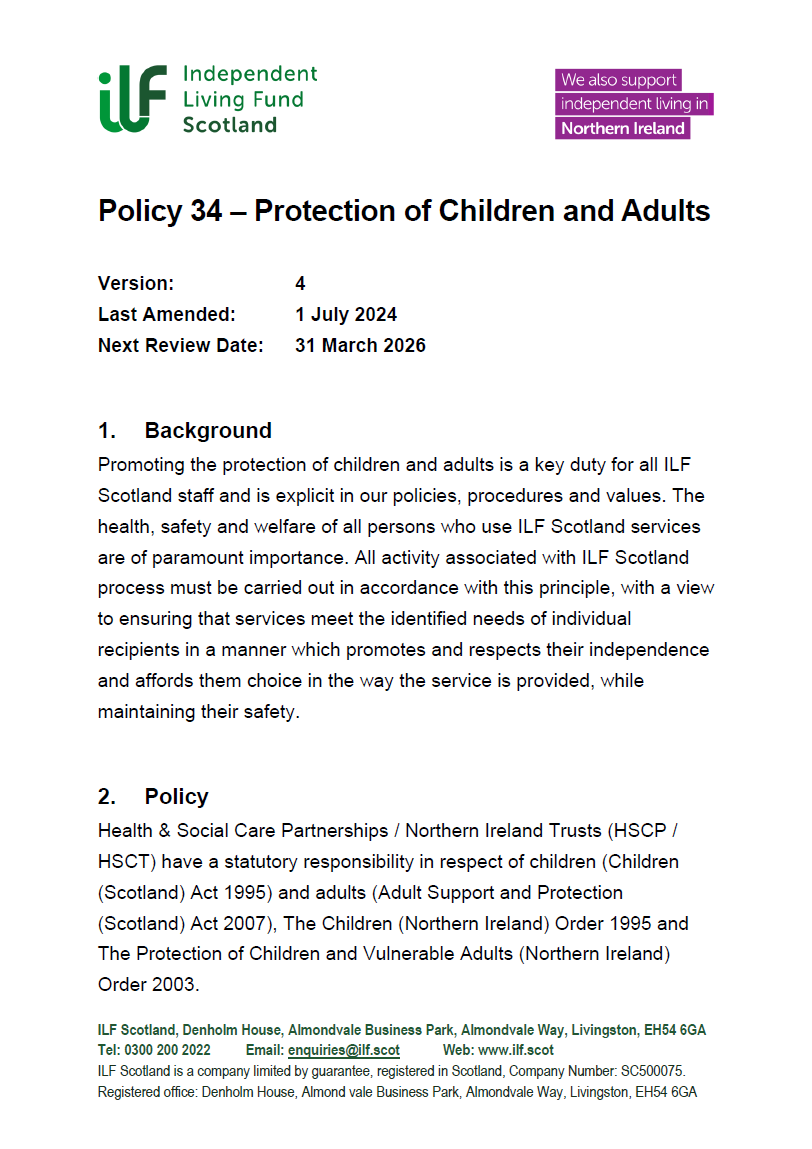
Version: 4
Last Amended: 1 July 2024
Next Review Date: 31 March 2026
Promoting the protection of children and adults is a key duty for all ILF Scotland staff and is explicit in our policies, procedures and values. The health, safety and welfare of all persons who use ILF Scotland services are of paramount importance. All activity associated with ILF Scotland process must be carried out in accordance with this principle, with a view to ensuring that services meet the identified needs of individual recipients in a manner which promotes and respects their independence and affords them choice in the way the service is provided, while maintaining their safety.
Health & Social Care Partnerships / Northern Ireland Trusts (HSCP / HSCT) have a statutory responsibility in respect of children (Children (Scotland) Act 1995) and adults (Adult Support and Protection (Scotland) Act 2007), The Children (Northern Ireland) Order 1995 and The Protection of Children and Vulnerable Adults (Northern Ireland) Order 2003.
In addition, there is National Guidance for Child Protection in Scotland 2021 - updated 2023 - gov.scot (www.gov.scot)
However, all services that work with children and adults are responsible for promoting, supporting and safeguarding the wellbeing of all children and adults at risk of harm and ensuring that members of the public know who to contact if they are concerned about a child or adult at risk of harm.
All ILF Scotland staff have a duty to report concerns of harm. If any ILF Scotland staff member becomes aware of potential or actual harm, they will act with or without the consent of the ILF Scotland applicant / recipient or of the person affected, by providing information in the form of a referral to the relevant HSCP / HSCT, and in line with the policy of that HSCP / HSCT. This will normally involve using an agreed referral form or by telephone.
For all ILF Scotland staff, protecting children and adults means recognising when to be concerned about their safety and understanding when and how to share these concerns. ILF Scotland provide all relevant staff and Board Members with Child and Adult Protection Awareness training, both at time of induction, followed by regularly updated training every three to five years or individually as required.
All staff should be familiar with this Protection Policy and the Procedure Guidance. All staff have the required Disclosure checks and Registered Body memberships.
If any staff member becomes aware of potential or actual harm, they will:
The Adult and Support Protection (Scotland) Act 2007 defines Adults at risk of harm or self-harm as adults who:
Abuse may be of a physical, psychological, sexual, financial, neglectful or discriminatory nature or other type. This could be a single act or repetitive acts. Examples include:
In Scotland, a child is generally considered to be someone under the age of 18. Child protection in Scotland should be seen in the context of the wider, “Getting It Right For Every Child” (GIRFEC) approach, the Early Years Framework and the UN Convention of the Rights of the Child. GIRFEC promotes action to improve the wellbeing of all children and young people in eight areas. These wellbeing indicators are known as SHANARRI (safe, healthy, achieving, nurtured, active, respected, responsible and included). The primary indicator for child protection is to keep a child safe and, in doing so, give attention to other areas of wellbeing as appropriate.
In Northern Ireland, the legislative framework for the child protection system is set out in The Children (Northern Ireland) Order 1995. This sets out parental responsibilities and rights and the duties and powers public authorities have to support children.
The creation of the regional Safeguarding Board for Northern Ireland (SBNI) was set out in law in the Safeguarding Board Act (Northern Ireland) 2011. This also established five Safeguarding Panels to support the SBNIs work at a Health and Social Care Trust (HSCT) level.
The Children’s Services Co-operation Act (Northern Ireland) 2015 requires public authorities to co-operate in contributing to the wellbeing of children and young people, in the areas of:
Abuse and neglect are forms of maltreatment of a child. Somebody may abuse or neglect a child by inflicting, or by failing to act to prevent, significant harm to the child. Children may be abused in a family or in an institutionalised setting, by those known to them, or more rarely, by a stranger. Child protection means protecting a child from child abuse or neglect.
Notwithstanding the duty to report concerns of harm, ILF Scotland supports recipients to exercise choice and control, promoting positive risk taking, to enable recipients to use their funding in an outcome focused way to lead independent lives.
Version 1: 1 July 2015
Version 2: 1 October 2018
Version 3: 13 March 2024
Version 4: 1 July 2024